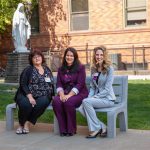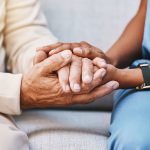Guyanna Ackison, an Army health care recruiter, University of Pittsburgh nursing student and mother of two, found her calling with the National Ovarian Cancer Coalition (NOCC). Watch the video above to learn about her cancer journey with UPMC, where she received genetic counseling and a preventive procedure.
Ackison underwent a precautionary procedure known as a preventive hysterectomy (removal of the uterus) and oophorectomy (removal of the ovaries) at the age of 33 after developing severe symptoms of endometriosis, where tissue normally found only in the uterus is present elsewhere in the body. Due to her extensive family history of breast and ovarian cancer — she lost her mother to cancer at age 14, and only later learned it had been ovarian cancer — she decided a complete hysterectomy with the removal of the ovaries would be the best bet to have a long, healthy, cancer-free life.
After her experience, she was fueled with the desire to become an advocate for awareness of the disease, and to engage in and support the survivor community.
She attended the NOCC’s annual Walk to Break the Silence on Ovarian Cancer TM in September, 2011, and found a new type of family amongst the members of the NOCC. “I did not know a single person, and I felt more at home than I probably had ever felt in all my travels,” says Ackison, who was stationed in Germany and Iraq during her career as a military nurse. “It was very calming.”
Also in attendance at the event were staff members from the office of her gynecologic oncologist, Dr. Edwards, who has been involved in and advocated for the NOCC sine the establishment of the organization’s Pittsburgh Chapter. “It’s important to me that the people [who] are our health care providers and take care of us are involved in organizations that the patients find important as well.”
At the walk, Ackison’s first NOCC event, she decided to sign up to volunteer. She recalls thinking, “This would be a nice way to give back,” and found herself jumping right into active volunteer work. She describes her experiences as a NOCC volunteer as extremely fulfilling, and compares it to the fulfillment she found from serving in Operation Iraqi Freedom and during the rest of her Army career.
During her first duty station in the military, Ackison worked in pediatric hematology oncology (cancers and blood-related disorders) and fell in love with her work. After returning from Iraq, she worked in a hospital in Fort Riley, Kansas, where she discovered her passion for education.
Today, Ackison goes to health fairs and talks to people about ovarian cancer—a disease that “that no one talks about because it’s your ovaries,” she says. She also helps present a lecture on ovarian cancer for one of her nursing classes at Pitt each semester.
“I was very upset when I found out my mom had [ovarian cancer],” Ackison explains. “Obviously then she didn’t understand the effects that it could have on me, but I just feel like it’s something that you need to tell your children.” Ackison’s own daughters are aware of her condition, volunteer regularly with the NOCC, and are her biggest driving force for advocating ovarian cancer awareness.
“It’s kind of hard when your 9-year-old comes to you and asks how it starts, and how do you get ovarian cancer,” she says. “To explain without being too technical, I just told her the cells kind of have a dance party and go a little crazy…but it’s not a good dance party.”
“The girls are absolutely amazing,” says Ackison. “They volunteer with us so they’re aware of what we do and who we are there [to support] — the survivors.”
Ackison is currently part of the NOCC council and works on logistics for the annual Run/Walk event, including signing up new volunteer members and fielding questions.
“I think awareness in being able to offer preventive treatment rather than operating on advanced cancers is how we can have an impact on the disease,” says Dr. Edwards.
“It’s really important for families to talk to one another. When [women] are experiencing things that just don’t seem right, it’s not always okay to push it off,” Ackison says.
Being aware of family history is key, notes Dr. Edwards. Even so, the current recommendation for any woman who has diagnosed with ovarian cancer is to participate in BRCA testing.
If positive, Dr. Edwards recommends the daughters be screened as well. “If they are positive, then they might want to change their reproductive decisions as they get into their 20s and 30s,” says Dr. Edwards. “And certainly [they] need to be followed by someone who knows the limitations of the available screening tests.”
Read more about Ackison’s personal experience with ovarian cancer and her ongoing treatment at UPMC.
More information on ovarian cancer getting involved in the NOCC is available here.








